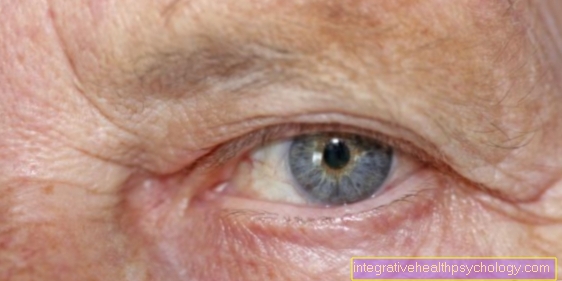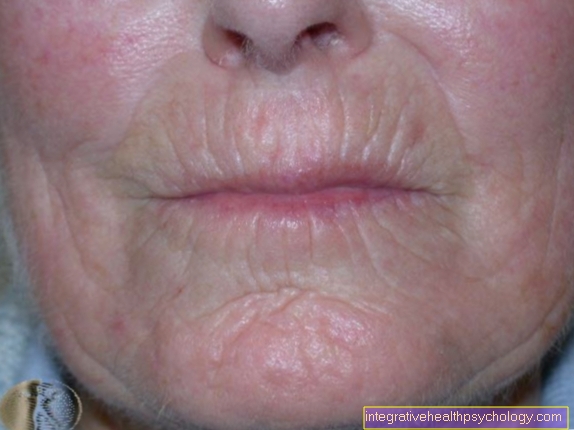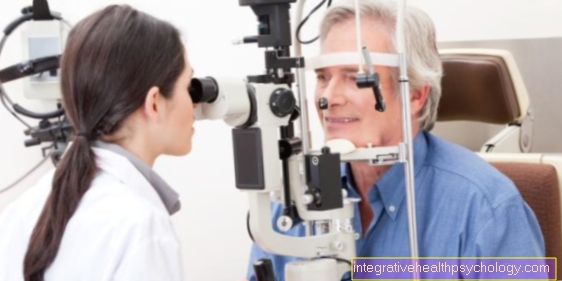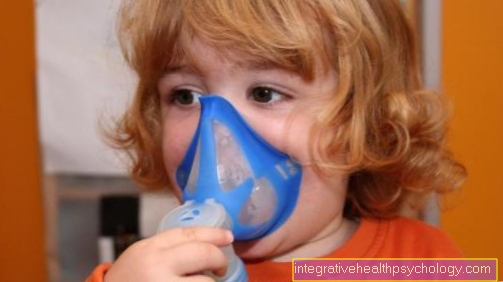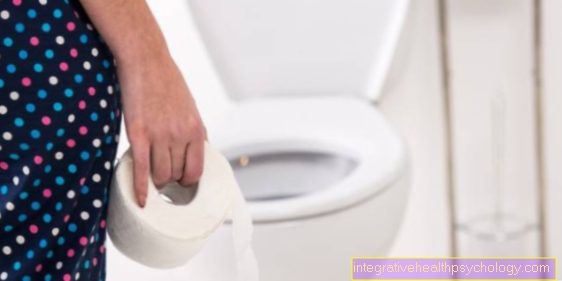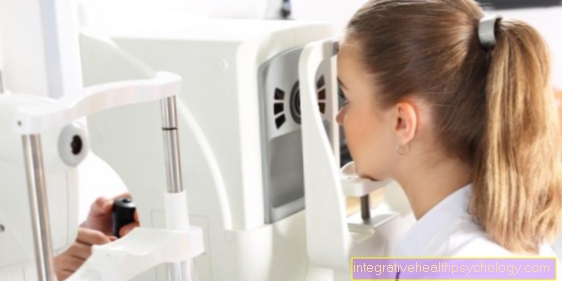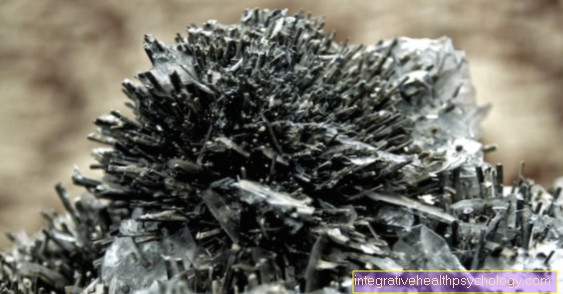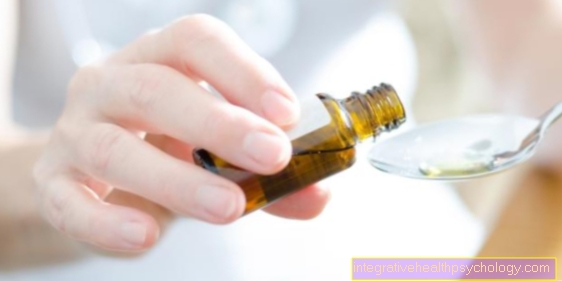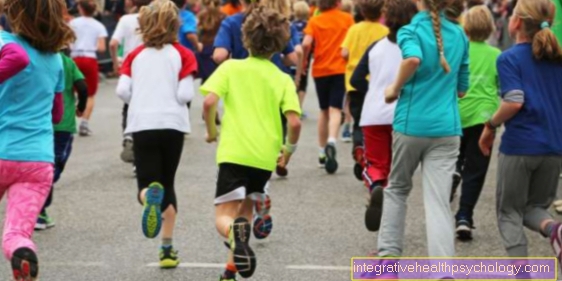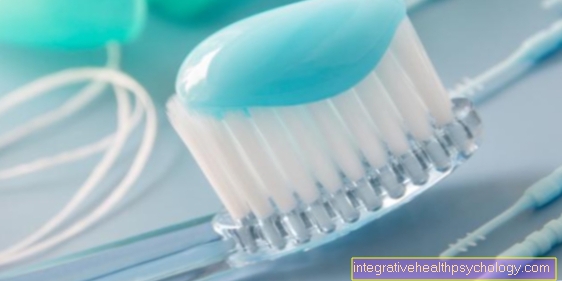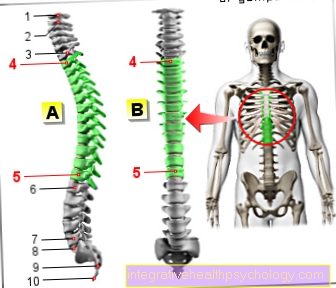Alcohol while breastfeeding
introduction
Many women want to return to alcohol after the deprivation they experience during pregnancy. Nonetheless, alcohol also poses a risk to the child during the breastfeeding phase beyond pregnancy. As a general rule of thumb, the alcohol concentration in the mother's blood is transferred to the breast milk to an almost equal extent and is absorbed by the child.
Since alcohol carries numerous risks for the newborn, it should be avoided if possible. If consumption is desired despite everything, careful and foresighted planning must be carried out in order to ensure a sufficiently large interval between the consumption of alcohol and the next breastfeeding session.
You can find more information on the topic here: Behavior during breastfeeding

Is alcohol allowed while breastfeeding?
The consumption of alcohol while breastfeeding is not recommended. The concentration of alcohol in the mother's blood is transferred to the mother's milk to an almost identical extent, so it is neither significantly reduced nor filtered in any way and made less dangerous. Alcohol is a hazard for the newborn even in small amounts.
If the infant has consumed alcohol through breast milk, its organism is only inadequately able to break it down again. The metabolic processes involved in this take much longer in a newborn than in an adult. Since breast milk has been shown to be the best food for the child and if the mother can and would like to breastfeed, she should avoid it for the duration of the breastfeeding period in view of the child's well-being.
If alcohol consumption is desired despite the risks, the mother should ensure that there is a sufficiently long interval between drinking and the next breastfeeding session. A time window corresponding to the amount of alcohol consumed, which is very individual, should be observed in order to give the organism enough time to break down the alcohol from the mother's bloodstream and breast milk.
Can I express beforehand?
There is a widespread misconception that milk that already contains amounts of alcohol can be pumped and disposed of and the following milk is safe for the child and can be administered. The fact is, however, that alcohol is supplied to milk through the maternal organism as long as alcohol can be measured in the mother's blood. Accordingly, the milk that follows pumping is also permeated with alcohol.
Expressing does not in any way accelerate the elimination of alcohol from breast milk. Only the time is the decisive factor after which breast milk can be classified as safe and free from alcohol again. Only when a time window corresponding to the amount previously consumed has passed after the alcohol intake has been stopped and the alcohol has been completely broken down in the maternal circulation, the milk is considered to be harmless. No pumping is necessary for this, as as soon as there is no more alcohol in the mother's blood, it is no longer detectable in breast milk either.
Consequences and harms of alcohol during breastfeeding
Alcohol consumption during breastfeeding affects both mother and infant and can have numerous consequences.
On the mother's side, alcohol affects the hormonal balance and reduces the content of oxytocin, the hormone that is responsible for the milk ejection reflex. The reduced milk flow creates a blockage of the milk, which can make the breasts appear fuller.
Contrary to the long-held opinion that alcohol would stimulate milk production, exactly the opposite is the case. The amount of milk produced is reduced, especially in the first four hours after consuming alcoholic beverages. In addition, newborns drink less milk containing alcohol and this can affect the entire breastfeeding relationship.
The texture and smell of the breast milk also change, which could be a reason for the reduced intake or complete refusal of breast milk by the infant.
Mother-child interaction can also be impaired during breastfeeding. Here, the alcohol influences the mother's psyche, whereby irritability and impatience can increase and it becomes more difficult for the child to touch the breast. A stronger negative influence of alcohol on behavior is observed in breastfeeding women, so they are more susceptible to upset, slowing down and drunkenness. These consequences, in turn, can reduce the mother's attention span and make her less receptive to child signals and make it difficult to act appropriately.
In the case of infants, on the other hand, alcohol often influences their sleep behavior, and sleep times are regularly shortened. In addition, sleep is less deep and the baby wakes up more easily. In addition, children are more irritable and more frightened after consuming alcoholic milk. The screaming phases lengthen. These effects are found in particular in newborns and decrease somewhat with increasing age of the child.
If the mother consumes a lot of alcohol, the child's growth may be impaired. Furthermore, the negative effects of alcohol on the child's motor development are discussed. There are not many studies that have looked at the direct effects of alcohol on the infant. However, the general recommendation in many countries is to avoid alcohol completely during breastfeeding or to keep consumption very low, with an appropriate interval before the next breast milk feed.
Alcohol in food
Can I eat alcohol chocolates while breastfeeding?
Even if pralines with mostly high-percentage alcohol are only eaten in small quantities, this amount of alcohol also passes into breast milk. The alcohol content of milk is very similar to the alcohol concentration in the mother's blood. Even if one might be inclined to rate this small amount of alcohol in only a few consumed chocolates as insignificant, there is currently no amount of alcohol that can be classified as safe for the newborn.
Accordingly, in order to be on the safe side, you should refrain from consuming alcoholic chocolates when breastfeeding. If the nursing mother still wants to eat alcohol chocolates, a sufficiently long interval should be ensured between consumption and the next feeding session so as not to expose the newborn to alcohol-related risks.
Read more on the topic: Diet while breastfeeding
Is cake with alcohol allowed during breastfeeding?
As with alcohol-containing chocolates, consuming alcohol-infused cakes during breastfeeding can appear harmless due to the small amount of luxury food. Nevertheless, the consumption cannot be classified as absolutely harmless. Since even small amounts of alcohol pass into breast milk, it can affect the child and have consequences.
This particularly affects the infant's sleep behavior, which can be disturbed even with the smallest amounts of alcohol. To be on the safe side, ideally you should either completely refrain from consuming the luxury food or ensure that there is sufficient time between consuming the alcoholic cake and the next breastfeeding session or pumping.
Cooking with alcohol while breastfeeding
Since alcohol can affect the baby during breastfeeding, it should be avoided if possible. Although the alcohol is often "boiled off" due to its relatively low boiling point at around 70 degrees Celsius, it takes up to three hours to fully remove all of the added alcohol. If the cooking time is shorter, only parts of the alcohol are reduced and a substantial part remains in the prepared dish.
Since any amount of alcohol ingested by the breastfeeding mother passes into breast milk, it should be discouraged if possible. Even the smallest amounts of alcohol can have an impact on the baby, and sleep behavior can be particularly affected. The sleep of the newborn is particularly susceptible to disruptive factors. If you still want to cook with alcohol, it is advisable to keep a time interval between the consumption of food containing alcohol and the next feeding unit. As a result, the body can sufficiently break down alcohol again and breast milk can be given again safely.



